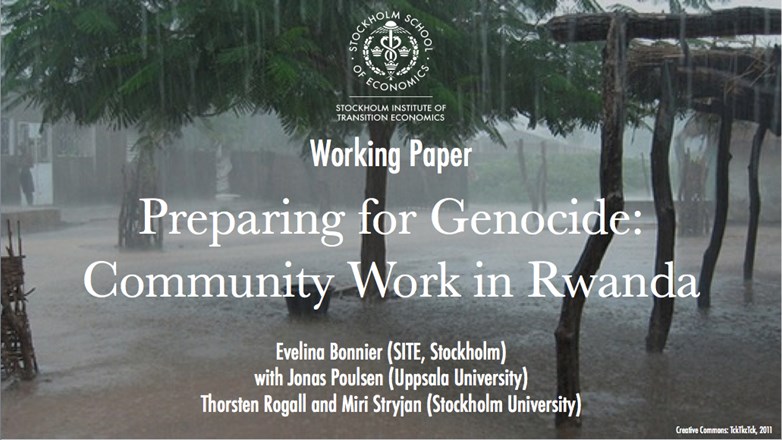Research investigates how political elites can prepare civilians for genocide
In this paper, Evelina Bonnier from Stockholm School of Economics and SITE, Jonas Poulsen from Uppsala University and Thorsten Rogall and Miri Stryjan from Stockholm University empirically investigate how community meetings in Rwandan villages were regularly used for spreading political propaganda.
During the Rwandan Genocide in 1994, around 430,000 Hutu civilians joined army and militiamen in violent activities killing an estimated 800,000 Tutsis and moderate Hutus in only 100 days. In light of this high death rate and the large number of civilian perpetrators, researchers wanted to better understand the causes of the civilian participation in the genocide. Based on anecdotal evidence suggesting that, in the years prior to the genocide, the weekly-held community meetings called Umuganda were used to sensitize and mobilize the civilian Hutu population to participate in the genocide, the authors empirically investigate the effect of these meetings on civilian participation in genocide violence.
The authors use local variation in rainfall as a proxy for lower participation in Umuganda meetings, expecting meetings to have been less enjoyable or altogether cancelled in the event of heavy rainfall. The fact that the community-work took place on every Saturday makes it possible to isolate the effect of Umuganda from general rainfall effects. Using cross-sectional variation in meeting intensity induced by exogenous weather fluctuations, authors provide the first empirical analysis of how important local Umuganda meetings might have been in inducing the civilian population to participate in the genocide.
Research insights
One additional rainy Saturday is associated with a 5 percent decrease in the civilian participation rate.
The results indicate a negative relationship between Umuganda intensity and civilian participation in the genocide. The results are robust to controlling for rainfall on all other weekdays and long-term trends in average rainfall. Importantly, the coefficients for the other weekdays are small and insignificant and the results pass a number of indirect tests of the exclusion restriction as well as other robustness checks and placebo tests.
Read more about the empirical investigation and the research results in the working paper “Preparing for Genocide: Community Work in Rwanda”. Working paper is also available on SITE SlideShare channel.




